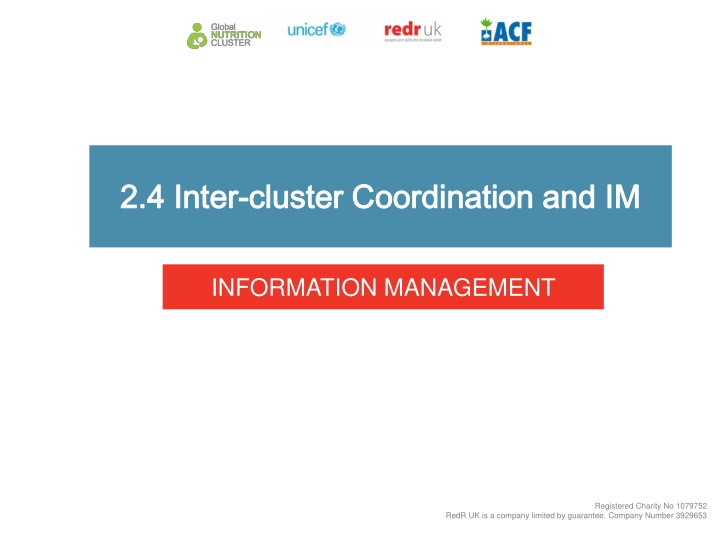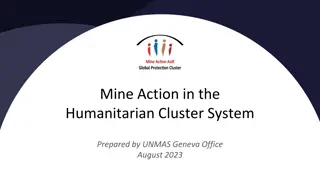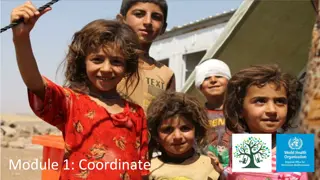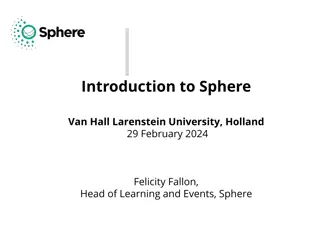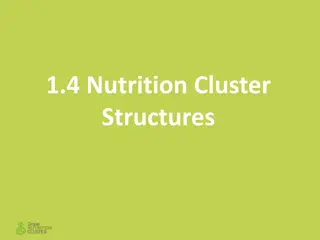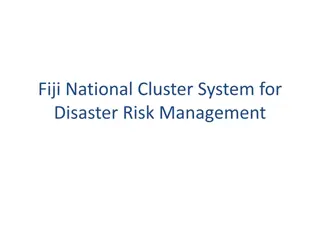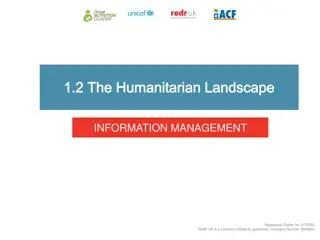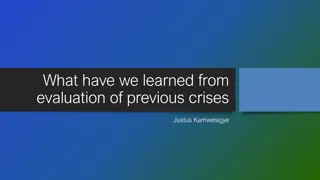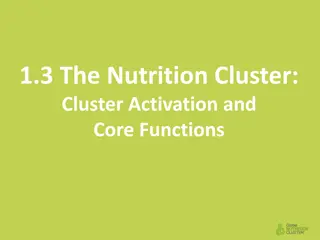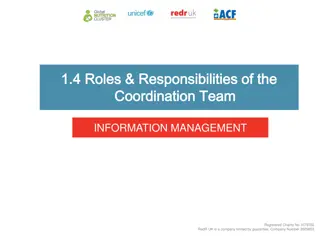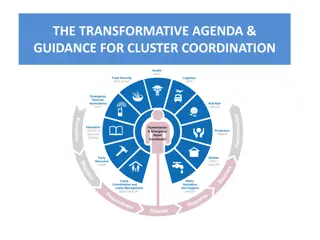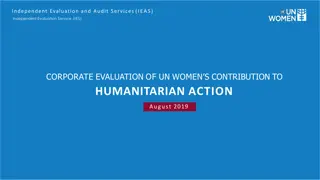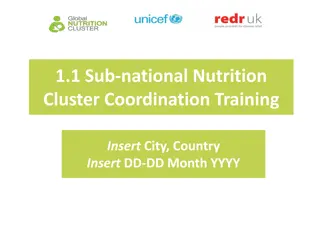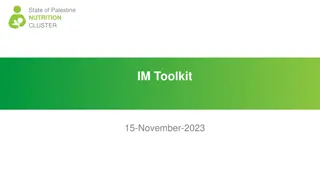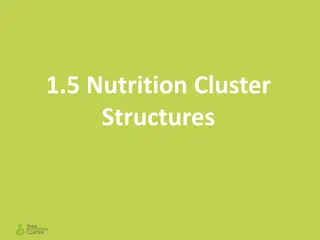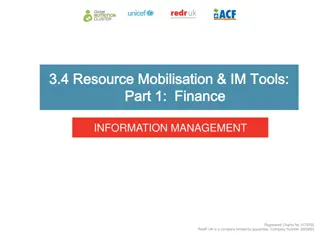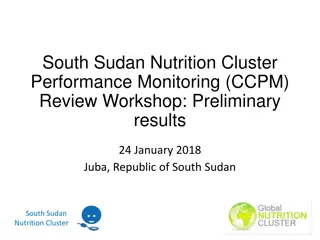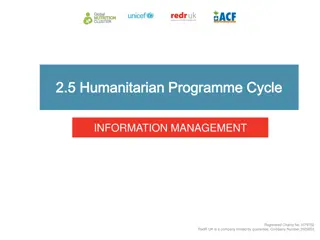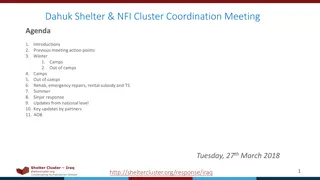Inter-Cluster Coordination and Information Management in Humanitarian Emergencies
Inter-Cluster Coordination and Information Management play vital roles in humanitarian emergencies. The coordination mechanism involves regular meetings convened by the RC/HC and coordinated by OCHA, providing opportunities for clusters to collaborate on shared planning, needs assessments, and pooled funds. The Intercluster IMWG aims to improve information management guidance and tools for the humanitarian community, focusing on strengthening needs assessments, enhancing data sharing within clusters, producing guidance for humanitarian information management, and developing a monitoring framework. Examples of IMWG inter-cluster work include needs assessments, strategic planning, resource mobilization, and implementation and monitoring of inter-cluster interventions. The GNC IM Toolkit offers various resources and templates to support information management in emergencies.
Download Presentation

Please find below an Image/Link to download the presentation.
The content on the website is provided AS IS for your information and personal use only. It may not be sold, licensed, or shared on other websites without obtaining consent from the author.If you encounter any issues during the download, it is possible that the publisher has removed the file from their server.
You are allowed to download the files provided on this website for personal or commercial use, subject to the condition that they are used lawfully. All files are the property of their respective owners.
The content on the website is provided AS IS for your information and personal use only. It may not be sold, licensed, or shared on other websites without obtaining consent from the author.
E N D
Presentation Transcript
2.4 Inter 2.4 Inter- -cluster Coordination and IM cluster Coordination and IM INFORMATION MANAGEMENT Registered Charity No 1079752 RedR UK is a company limited by guarantee. Company Number 3929653
Inter-Cluster Coordination Mechanism Convened regularly by the RC/HC Coordinated by OCHA Opportunity for clusters to meet through each CC s representation. Shared planning and outputs, including HNO, HRP, Flash Appeal, needs assessments and Pooled Funds, among others.
Intercluster IMWG Objectives In order to provide the humanitarian community with improved information management guidance and tools, the primary objectives of the IMWG are to: Strengthen needs assessments efforts from an Information Management perspective; Enhance the effectiveness of data and information sharing and management within the cluster approach; Produce agreed guidance and information systems to implement humanitarian information management in the field; Develop a framework for monitoring the effectiveness of IM in humanitarian emergencies.
Examples of IMO inter-cluster work What examples can you give? Needs assessments and analysis: nutrition survey include hygiene practices Strategic planning: provide CC data on proportion of SCs that do not have adequate WASH facilities for discussion with WASH cluster Resource mobilisation: Exchange info on funding for inter-cluster projects with other clusters/sectors Implementation and monitoring: Exchange programme and monitoring data on inter-cluster interventions with e.g. GBV sub cluster or PSEA task force
GNC IM Toolkit Dashboards templates Key datasets IM Surveys database HIR HRP tips 4 W Checklist Gap analysis tool IM Update PPT template Caseload targets & supplies Map Partners reporting tool M&E examples/ templates Framework Financial tracking tool BMS Code Violations tracking Country bulletin template ToR for IMO Capacity mapping IMO Meeting agenda template Meeting minutes template Web-site for HR.info Guide NC Style Guide Contact list template handover template
GNC IM Toolkit Dashboards templates Key datasets IM Surveys database HIR HRP tips 4 W Checklist Gap analysis tool IM Update PPT template Caseload targets & supplies Map Partners reporting tool M&E examples/ templates Framework Financial tracking tool BMS Code Violations tracking Country bulletin template ToR for IMO Capacity mapping IMO Meeting agenda template Meeting minutes template Web-site for HR.info Guide NC Style Guide Contact list template handover template
Key datasets tool The key datasets tool is an Excel-based spreadsheet which was created to inform decision-making and assist in producing useful information. Contains a list of key datasets and sources of information Classified according to geo-data, food security, WASH, health, nutrition and people GNC maintains the tool and IMO/NC use it as needed.
Exercise: Identifying multi-cluster key datasets to inform responses Using your assigned scenario, identify key datasets that would be used to inform planning Group 1: Cyclone Haiyan, Philippines Group 2: Conflict, IDPs and food security, South Sudan Group 3: Ebola crisis, Sierra Leone, Liberia and Guinea Group 4: Syrian refugee crisis, Jordan Group 5: Sahel-Food insecurity
Cyclone Haiyan Philippines 2014 You are here Ebola response Sierra Leone, Liberia, Guinea 2014/2015 Syrian Refugees in Amman, Jordan, 2014/2015 Conflict IDP and food security crisis South Sudan 2014/2015 Sahel Food insecurity 2011-2015
Tips for Inter-Cluster IMOs Use matrices to identify overlap/gaps Draw support from OCHA Advocate for Nutrition Share information Be Be prepared to compromise Proactive!! Encourage attendance at other cluster meetings Build relationships outside meetings Registered Charity No 1079752 RedR UK is a company limited by guarantee. Company Number 3929653
